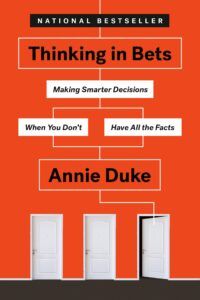Thinking In Bets is a book by professional poker player Annie Duke. Its a book about better decision making under uncertainty.

- All Facts have a half-life. Many scientific facts have been proven wrong. We, non-scientists, should be even more humble. Rather than stating beliefs, we should state our confidence in those as well. This makes it more palatable to change opinions in the future. For example, going from 58% to 42% is easier than going from yes to no.
- We are not natural truth-seekers. We assume whatever we hear is true. And then when new facts appear, we don’t even update our original beliefs, rather we reinterpret the new data in light of the existing beliefs.
- Results are outcomes of both our decision as well as luck. We should focus our efforts to get the processes right. We can’t control luck. It is best not to be bothered by it.
- We take credit for their successes and blame the failures on their bad luck. We do the reverse while judging other humans. Always consider diverse perspectives. E.g. when someone runs over a red light, don’t just assume that it was intentional.
- We prefer preserving our self-image over a more objective representation of the world. This can be uncomfortable at times. You cannot pull someone out of this “Matrix-movie-like scenario” unless they willingly want to choose a more objective view of the world.
- While discussing with others, always go with an exploratory approach. The natural tendency is to engage in confirmation bias.
- Make yourself accountable. A bet is a form of accountability. People are more willing to offer their opinion in a room if the goal is to win a bet instead of getting along with others in the room!
- In 1960, scientists paid for by the pro-sugar lobby funded research that blamed “fat” instead of “sugar” for obesity. This might seem like an obvious conflict of interest. But we suffer from internal conflicts of interest regularly. For example, instead of assuming someone is better than us, we think he is better at schmoozing the boss.
- 10-10-10 rule - While making a decision think about the consequences of your decision in 10 mins, 10 months, and 10 years.
- Scenario planning - Engaging in scenario planning makes one prepared for the various future outcomes. This prevents hindsight bias where one thinks that this future outcome was an obvious one.
- Mental contrasting is a technique where a person imagines the obstacles in the way of their goals. This leads to a better chance of success in attaining one’s goals. It is a better technique than just dreaming about one’s goal.